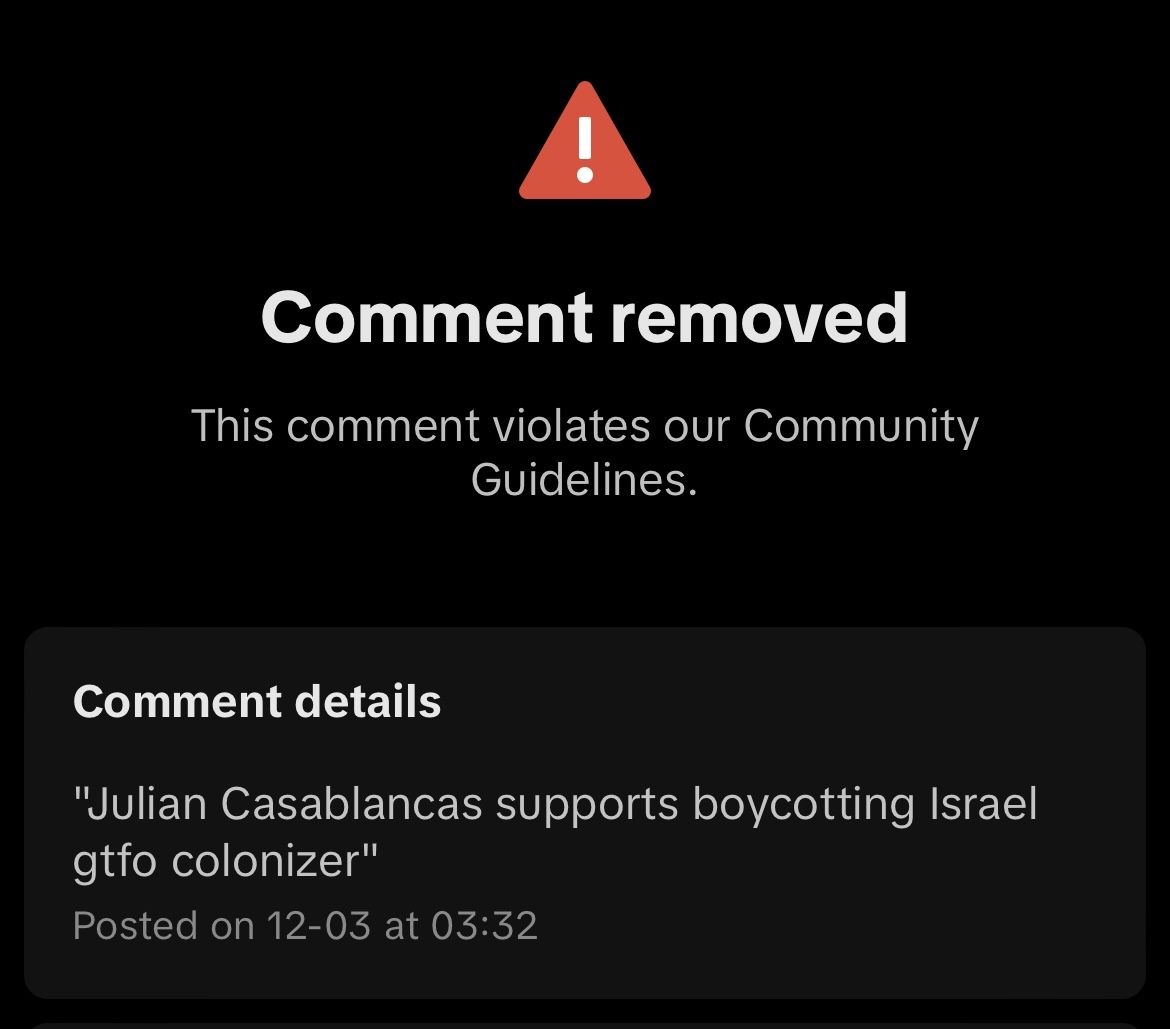There’s certainly a larger anti-zionist crowd on the app, but western tiktok is 100% still run by neoliberal ghouls
I’ve reported blatantly fascist stuff on the platform before; a comment saying race mixing is immoral, a comment saying desegregation ruined America, a video saying Gaza should be turned into a parking lot, and I’ve ALWAYS ended up getting the “we’ve reviewed your report and found no violation” thing. Exact same shit I’ve gotten with Instagram, Reddit, and pre-Musk Twitter
Meanwhile today I commented this at a The Strokes fan with an Israeli flag in their name, and fully ratio’d them before getting this notification a few hours later:



I heard some left commentary on this issue that I think best sums up what we have seen with censorship from these companies: The government pressures private companies that own these platforms to establish private censorship guidelines to get around constitutional protections against censorship.
I think that currently the government is struggling to adapt their censorship regime to the new communications structure/technology brought on by the growth and evolution of the internet. They haven’t got the new censorship regime completely down yet.
Also, isn’t it the most neolib thing imaginable for the government to manage its censorship regime through what is essentially a web of public-private partnerships with companies like Google.
I don’t even think they need to apply pressure at the corporate level most of the time. The decision makers for stuff like this have only two sources of work that maintain their standard of living: other media companies, and government work. It’s very easy to pressure people with extremely specialized line of work,.
deleted by creator
I agree that the method of control you outlined is a facet of exerting influence over the media. Manipulating these specialized career holders can be a good way to maintain a cohesive media narrative.
The legacy media is easy to control via “access” fetishization. Media outlets want access to officials to get scoops and easy quotes on breaking issues, those officials only give access to reporters and outlets favorable to the state narrative, ergo a “passive” censorship. But with new media, that dynamic doesn’t exist; Hasan Abi doesn’t need “access” in order to get viewers.
Which is part of the reason I think they’ve been pushing the “fake news/misinformation is a threat to democracy” rhetoric. Rather than engineering a new censorship paradigm, they’re running a propaganda campaign of “stay with the legacy media else you risk being duped by fake news.” Notice that this rhetoric is never about improving people’s critical thinking skills as to identify bad arguments/sources.
I agree. “Access fetishization” as you stated is important facet of maintaining control of the narrative. This particularly potent in an age when traditional media is starved of revenue to maintain the option of independent investigatory teams and instead relies heavily on the agencies themselves for sources on the stories covering them. Defense and foreign policy reporting are particular infamous for this.
I would disagree a bit and that the establishment does have a rhetoric of improving people’s critical thinking skills in promoting the so-called right sources of approved traditional media outlets. From my experience working with civics teachers, they can emphasis those sources as the true source of critical thinking, or if not that then promote in lesson plans “critical thinking” on media that always treats center-right positions as somehow the most objective and true perspective. They promote those methods in their rhetoric as the true ways to promote critical thinking, and even though we on the left disagree with them, that is how many of them sincerely view it.
Nah, there’s still a government agency overseeing all those public-private partnerships. Peak neoliberalism would be introducing a market-based system where the government pays out bounties for reducing discussion in specific topics, opening up room for independent traders to swap those bounties based on their differing strategies for how to pay off private media companies in yet another market where the companies charge for censoring certain keywords or sentiment clusters.